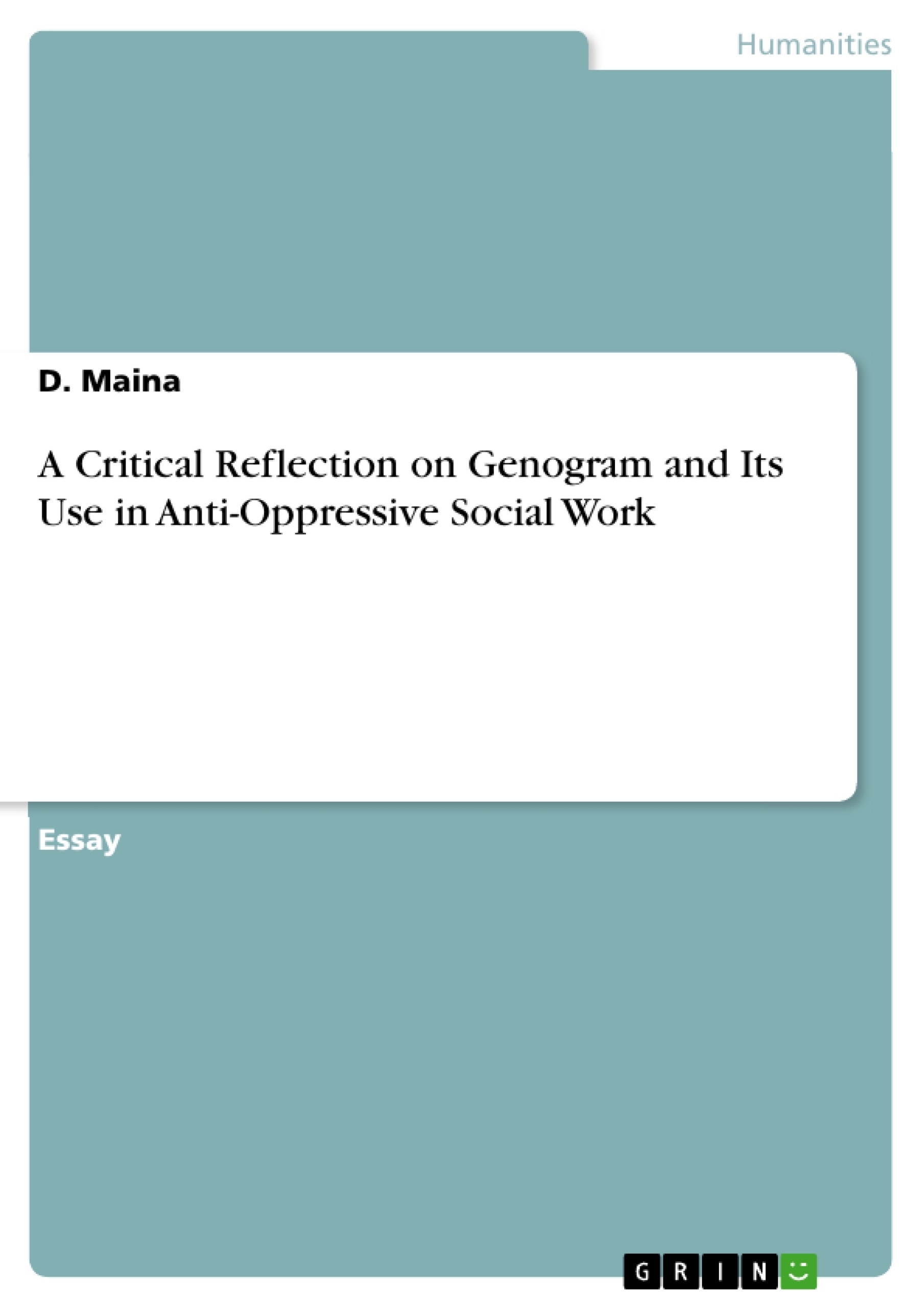Genograms are a fundamental resource for social workers or human service workers because they enable these workers to educate their clients about their family of origin in a comprehensive way. The major strength of genograms in social work practice is the ability to give a detailed pictorial representation of a client's family from which a lot of information can be derived to provide a solid foundation for offering help. The simplified visual representation of complex family dynamics helps clients understand their own experiences more effectively and encourages them to become active participants in therapy.
Table of Contents
- Q1.
- Q2.
- Q3.
Objectives and Key Themes
This reflection paper aims to critically examine the use of genograms in anti-oppressive social work practice. It explores the author's personal experience creating a genogram, analyzing its strengths and limitations in understanding family dynamics and informing therapeutic interventions.
- The therapeutic potential of genograms in revealing family patterns and relationships.
- The limitations of traditional genogram design in representing diverse family structures and identities, particularly within the LGBTQ+ community.
- The importance of a strengths-based approach in social work practice, leveraging clients' experiences to foster resilience.
- Ethical considerations and the need for inclusive representation in genogram construction.
- The impact of intergenerational trauma and its role in shaping individual experiences.
Chapter Summaries
Q1: This section details the author's personal experience creating a genogram, highlighting the emotional challenges of revisiting painful family history, including instances of addiction, death, and sexual abuse. The process of constructing the genogram led to a deeper self-reflection on the author's identity and the impact of family dynamics on their personal life. Despite the pain, the author also discovered a renewed awareness of strong relationships within their family, noting closer ties with their maternal relatives.
Q2: This section examines the strengths and limitations of genograms as a tool in social work. The author emphasizes the value of genograms in visually representing complex family relationships, allowing for the identification of patterns of behavior, intergenerational trauma, and the quality of familial connections. This visual aid assists social workers in understanding family functionality and tailoring interventions. However, the section critically analyzes the inherent biases within traditional genogram design, highlighting the exclusion of diverse gender and sexual identities and the lack of representation for same-sex relationships. This points to the urgent need for inclusive genogram models that accurately reflect the realities of modern families.
Q3: This section reflects on the implications of a strengths-based approach in social work. Emphasizing the importance of recognizing the client's wisdom and resilience derived from their experiences, it advocates for harnessing these strengths in therapeutic interventions. The author proposes that understanding a client's personal perspective and experiences, as revealed through the genogram, allows for personalized and empowering interventions, moving beyond a deficit-based model that focuses solely on weaknesses.
Keywords
Genogram, family dynamics, anti-oppressive social work, strengths-based approach, intergenerational trauma, LGBTQ+ inclusion, ethical considerations, family history, therapeutic intervention, resilience.
Frequently Asked Questions: A Reflection on Genograms in Anti-Oppressive Social Work Practice
What is the main focus of this reflection paper?
This reflection paper critically examines the use of genograms in anti-oppressive social work practice. It explores the author's personal experience creating a genogram, analyzing its strengths and limitations in understanding family dynamics and informing therapeutic interventions.
What are the key themes explored in the paper?
Key themes include the therapeutic potential of genograms, the limitations of traditional genogram design in representing diverse families (especially LGBTQ+ families), the importance of a strengths-based approach, ethical considerations for inclusive representation, and the impact of intergenerational trauma.
What is the author's personal experience with creating a genogram?
The author details the emotional challenges of revisiting painful family history (addiction, death, sexual abuse) while creating their genogram. This process led to deeper self-reflection and a renewed awareness of strong family relationships.
What are the strengths of using genograms in social work?
Genograms are valuable for visually representing complex family relationships, identifying behavioral patterns, intergenerational trauma, and the quality of familial connections. This visual aid helps social workers understand family functionality and tailor interventions.
What are the limitations of traditional genogram design?
Traditional genograms have inherent biases, excluding diverse gender and sexual identities and lacking representation for same-sex relationships. This highlights the need for inclusive genogram models.
How does the paper address a strengths-based approach?
The paper emphasizes recognizing clients' wisdom and resilience, advocating for harnessing these strengths in therapeutic interventions. Understanding a client's perspective, as revealed through the genogram, allows for personalized and empowering interventions.
What ethical considerations are discussed?
The paper emphasizes the ethical need for inclusive representation in genogram construction to accurately reflect the realities of modern families and avoid perpetuating biases.
What are the key takeaways from this reflection paper?
The paper advocates for the use of genograms as a valuable tool in social work, but stresses the critical need for inclusive and ethical practices that account for diverse family structures and the complexities of intergenerational trauma. It promotes a strengths-based approach to empower clients and move beyond deficit-based models.
What are the keywords associated with this paper?
Genogram, family dynamics, anti-oppressive social work, strengths-based approach, intergenerational trauma, LGBTQ+ inclusion, ethical considerations, family history, therapeutic intervention, resilience.
- Quote paper
- D. Maina (Author), 2023, A Critical Reflection on Genogram and Its Use in Anti-Oppressive Social Work, Munich, GRIN Verlag, https://www.grin.com/document/1405566




